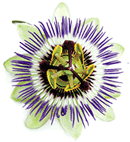
Passion Flower
Introduction
This fact sheet provides basic information about Passion Flower. The term "passion flower" connotes many of the approximately 400 species of the genus Passiflora, which are primarily vines. Some of the species are noted for their showy flowers, others for their edible fruit.The passion flower was discovered in 1569 by Spanish explorers in Peru, who saw the flowers as symbolic of the passion of Christ and, therefore, a sign of Christ's approval of their efforts. This is the origin of the scientific and common names. The folklore surrounding this plant possibly dates further into the past. The floral parts are thought to represent the elements of the crucifixion (3 styles represent 3 nails, 5 stamens for the 5 wounds, the ovary resembles a hammer, the corona as the crown of thorns, the petals representing the 10 true apostles, with the white and bluish-purple colors those of purity and heaven). In Europe, passion flower has been used in homeopathic medicine to treat pain, insomnia related to neurasthenia or hysteria, and nervous exhaustion. Other indications have included bronchial disorders (particularly asthma), compresses for burns, inflammation, inflamed hemorrhoids, climacteric complaints, pediatric attention disorders, and pediatric nervousness and excitability.
Common Names
Passion Flower, Passion Fruit, Granadilla, Water Lemon, Maypop, Apricot Vine, Wild Passion Flower, Jamaican HoneysuckleLatin Names
Passiflora incarnataWhat It Is Used For
- Passion flower has been used to treat sleep disorders and historically in homeopathic medicine to treat pain, insomnia related to neurasthenia or hysteria, and nervous exhaustion.
How It Is Used
No clinical trials of passion flower as a single agent have been reported; however, a daily dose of 4 to 8 g is typical.What the Science Says
- Human studies of Passiflora species as a sedative/anxiolytic have been conducted. A case report using the plant in a combination natural product, Calmanervin , for successful sedation before surgery was reported. In a multicenter, double-blind trial of 91 patients, Passiflora (in combination, Euphytose ) exhibited statistically significant differences when compared with placebo in the treatment of adjustment disorder with anxious mood. A study of Passiflora in the combination product Compoz contradicts these last 2 studies. It was not possible to differentiate between aspirin or placebo when tested as a daytime sedative. However, the duration of this study was only 2 weeks.
- Passion flower's ability to reduce anxiety makes it useful for asthma, palpitations, and other cardiac rhythm abnormalities, high blood pressure, insomnia, neurosis, nervousness, pain, and other conditions. However, no clinical data is available to support any of these potential uses.
Side Effects and Cautions
- None well documented.
Sources
- Drugs.Com Web site. Accessed on February 7, 2009.
- From Wikipedia, the free encyclopedia. Accessed on February 7, 2009.






